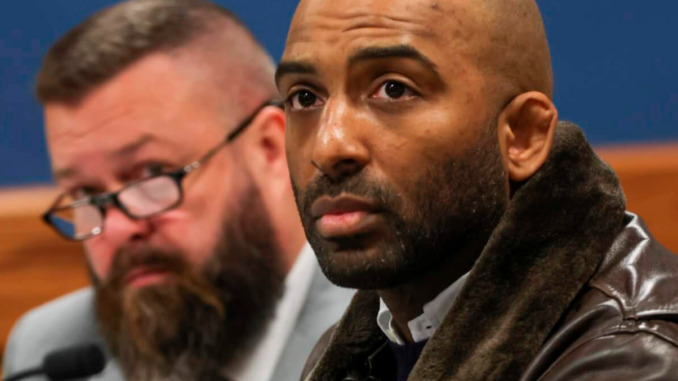E. Rowell: Also see: “SOS – GEORGIA AGAIN!” for the latest update on the most recent efforts being made in Georgia to again cheat on the upcoming election in 2024.
Ultimately, Floyd’s actions have injected new life into claims of election fraud that many had hoped were settled.
By Eric Lendrum, AMERICAN GREATNESS 21 May 2024

In an unexpected twist, Harrison Floyd, the lone defendant in the Fulton County RICO case to spend time in jail, has disrupted the proceedings by attempting to prove that Donald Trump won the 2020 election in Georgia. This unique legal strategy contrasts sharply with the approach taken by others who have distanced themselves from claims of election fraud, and it appears to be working.
Unfinished Business
Floyd, the former head of Black Voices for Trump, faces felony charges for his alleged involvement in harassing an election worker. Instead of backing down, Floyd rejected a plea deal and on November 3, 2023, his attorneys launched an aggressive campaign to gather evidence they believe will exonerate him. Floyd’s attorneys issued subpoenas targeting state and local government agencies, seeking a vast array of documents and records related to the 2020 election. This includes all mail-in absentee ballots cast in Fulton County, reports from Dominion Voting Systems, and forensic images of servers used to count votes. Additionally, they demanded an unredacted copy of the Secretary of State’s investigative report on alleged election fraud at State Farm Arena.
The defense argues that if they can demonstrate irregularities or unresolved discrepancies in the ballots, it could destroy the prosecution’s case. Floyd’s attorneys assert that their client’s belief in possible election fraud was reasonable and that there was no criminal intent behind his actions. They also said that the subpoenas would yield exculpatory evidence that challenges the validity of the state’s indictment.
However, their requests have faced significant pushback from the agencies involved. The Georgia Secretary of State’s office and the Fulton County Board of Registration and Elections have filed motions to quash the subpoenas, describing them as overly broad, burdensome, and a “fishing expedition.” They argue that fulfilling these requests would be prohibitively time-consuming and costly, requiring extensive redactions to protect personal information.
During a January court hearing, attorneys for the state expressed concerns about the relevance of the requested documents to Floyd’s intent. They emphasized that the scope of Floyd’s subpoenas would place an undue burden on government employees and questioned the utility of retroactively proving events from three years ago. Judge Scott McAfee, who is overseeing the case, acknowledged the challenges in balancing the rights of the defendant with the need to safeguard sensitive information and requested further details on the logistics and costs of producing the requested documents.
Where There’s Smoke…
Floyd’s defense strategy has now taken on additional significance in light of recent developments. On May 7, the Georgia State Election Board (SEB) voted to reprimand Fulton County for numerous violations of Georgia election law during the 2020 election and recount. SEB Member Edward Lindsey cited clear evidence of misconduct, including the failure to maintain 380,000 ballot images and discrepancies found during the recount. Dr. Janice Johnston, another SEB member, called the election conduct “unacceptable” and highlighted issues with the security and authenticity of votes from advanced voting locations and ballot boxes.
Johnston’s motion to amend the official recount results and investigate further did not pass, but it underscored ongoing concerns about election integrity in Georgia. This reprimand, coupled with Floyd’s aggressive defense, casts a shadow over District Attorney Fani Willis, the entire Fulton County case, and raises questions about the handling of the 2020 election.
Floyd’s insistence on pursuing this line of defense not only complicates the prosecution’s efforts but also rekindles debates about the legitimacy of the 2020 election results. His approach diverges from that of other defendants who have opted for plea deals, potentially fracturing the united front the prosecution hoped to present.
Fani’s Worst Nightmare Strikes Again
This legal maneuvering has introduced significant delays and procedural hurdles, demonstrating the disruptive potential of Floyd’s strategy. By challenging the foundational premise of the indictment—that Trump lost the 2020 election and the defendants knowingly conspired to alter the results—Floyd is forcing the court to reconsider the evidence and the narratives that have dominated the case thus far.
Ultimately, Floyd’s actions have injected new life into claims of election fraud that many had hoped were settled. His case may serve as a litmus test for the robustness of the evidence supporting the 2020 election results and the integrity of the legal proceedings surrounding them. As the Fulton County RICO case continues to unfold, it is clear that Floyd and his attorneys have thrown a substantial wrench into the works, with implications that could resonate far beyond the courtroom.



So the effort by government employees, who are trying to hide the Information needed to prove the innocence of an accused citizen, would place an undue burden on these government employees who are employed by the acccused, the court and the judge. If the burden was really undue, this claim of subversion of government resources can be added to the complaint list. They must provide the required evidence post haste or else…